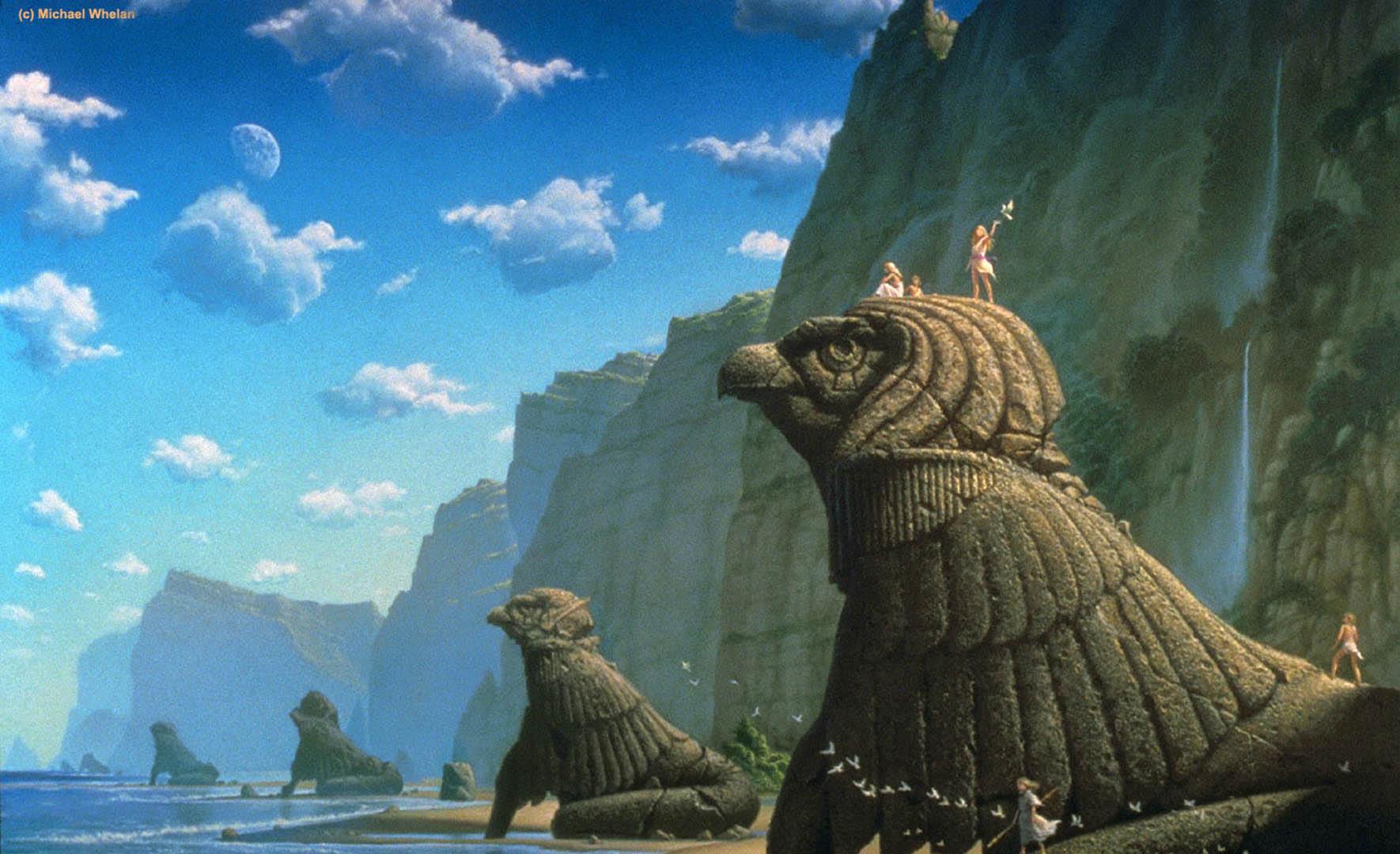Appendix
B:
Random
Wilderness Terrain

Appendix
B:
Random
Wilderness Terrain

|
|
|
|
|
|
If a wilderness expedition
moves into an area where no detailed map has been prepared in advance,
the random terrain determination
system below can be utilized with relative ease for a 1 space = 1 mile,
or larger, scale.
In using it, however, common
sense must prevail.
For example, if the expedition
is in the north country the forest will be pine or possibly scrub, while
in tropical regions it will be jungle.
Similarly, if a pond is
indicated in two successive spaces, the two should be treated as one larger
body of water.
The Dungeon Master must
also feel free to add to the random terrain as he sees fit in order to
develop a reasonable configuration.
In any event, the DM must
draw in rivers, large lakes, seas, oceans, and islands as these features
cannot easily be generated by a random method.
As the party enters each
space, generate a random number from 1 to 20.
Find the type of terrain
the party is currently on by reading across the page,
then read down the column
until you find the line where the random number generated falls, and simply
move left to determine the terrain that predominates in the new space.
If a pond is indicated, the terrain it is in is the same as that of the previous space.
If a depression is indicated,
the referee must decide as to its nature and extent.
Generally, the terrain i
t is in must be the same as the previous space.
A depression in a marsh
is some form of lake.
Note: Glens in forests, paths/tracks,
and streams can be included as desired.
Paths/tracks
and streams must lead to/from unmapped spaces, of course.
Terrain Guide:
Plain:
tundra, steppe, savanna, prairie, heath, moor, downs, meadow

Scrub:
brush, veldt, bush, thickets, brackens

Forest: woods, jungle, groves and copses (light forest)

Desert: barrens, waste, flat, snowfield
Hills: ridges, bluffs, dunes
Mountains:
mesas, glacier, tors

Marsh:
fen, slough, swamp, bog, mire, quagmire, morass
Pond: pools, tarn,
lake
Depression: gorge,
rift, valley, canyon
<> <> > Terrain (World Map)>
| Sub-Terrain | Plain | Scrub | Forest | Rough | Desert | Hills | Mountains | Marsh |
| Plain | 1-11 | 1-3 | 1 | 1-2 | 1-3 | 1 | 1 | 1-2 |
| Scrub | 12 | 4-11 | 2-4 | 3-4 | 4-5 | 2-3 | 2 | 3-4 |
| Forest* | 13 | 12-13 | 5-14 | 5 | - | 4-5 | 3 | 5-6 |
| Rough | 14 | 14 | 15 | 6-8 | 6-8 | 6-7 | 4-5 | 7 |
| Desert | 15 | 15 | - | 9-10 | 9-14 | 8 | 6 | - |
| Hills** | 16 | 16 | 16 | 11-15 | 15 | 9-14 | 7-10 | 8 |
| Mountains*** | 17 | 17 | 17 | 16-17 | 16-17 | 15-16 | 11-18 | - |
| Marsh | 18 | 18 | 18 | 18 | 18 | 17 | - | 9-15 |
| Pond | 19 | 19 | 19 | 19 | 19 | 18-19 | 19 | 16-19 |
| Depression | 20 | 20 | 20 | 20 | 20 | 20 | 20 | 20 |
* 1 in 10 also includes hills.
** 1 in 10 also includes
forest.
*** 1 in 20 have pass
which leads through the range.
INHABITATION
Check each space for the
possibility of inhabitation. Use random numbers 01 to 00.
| Type of Settlement | Population | |
| Single Dwelling | 01-03 | 1-12 |
| Thorp | 04-05 | 20-80 |
| Hamlet | 06-07 | 100-400 |
| Village | 08-09 | 600-900 |
| Town | 10 | 1,500-6,500 |
| City | 11 | 10,000-60,000 |
| Castle | 12-14 | * See Castle Tables, APPENDIX C, pp.182-183 |
| Ruins | 15-16
Roll Again Village 01-30 City 31-60 Shrine 61-85 Tomb 86-00 <make sub-table> |
- |
| Uninhabited | 17-00 | - |
<
30-mile
Hex Map (citation
: contact author, ask for permission to incl.) (get a .jpg of this for
use as an image)
>

Quote:
Originally Posted by mistere29
Gary, i read in an old interview
"by creating the village of Hommlet and the temple [sic] of Elemental Evil to test some ideas I had about random dungeons, and outdoor terrain so forth."
Could you eleaborate a bit
on this. Was the pre-Metzner draft largely designed by the random tables
in the dmg?

Howdy!
The village
and main temple areas were carefully mapped before I began adventure sessions
in the area.
The random generation was
used mainly in developing the land around the village and some of the side
areas surrounding the main rooms I had done for the temple
dungeons.
As a side note, the random
tables worked quite well, but they took too long.
I found that it was easier
and quicker for me to just bash ahead as usual and put in whatever I liked
at the moment.
Cheers,
Gary
<note to self: try to be a little more precise with the file names for the images>
![]()
Reduce - Reuse - Recycle